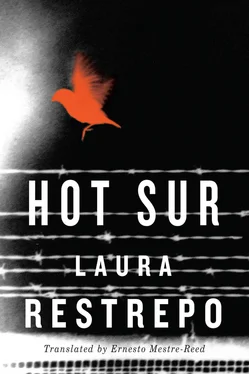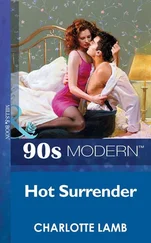As the clock wound down, Rose was able to gather himself enough to play one last card. If this guy has secrets, he thought, he’s not going to want them revealed. So he mentioned that he had María Paz’s manuscript of confessions about her life.
“You are in it,” Rose asserted, thinking it would be taken either as flattery or as a threat.
“What?”
“Her manuscript. Very long and detailed. And you’re mentioned in it. A few times. I have it here.”
“May I see it?”
“Only if you tell me what she was accused of.”
Pro Bono sighed, took a couple of sips of coffee, of which he had not offered Rose any, and made a gesture like a rabbit, wrinkling his nose and showing his teeth before responding.
“Alright, Mr. Rose. You win. What you’ll hear is off the record,” he warned, after he had the manuscript in hand and had browsed through it quickly. “I’m going to tell you what happened only once. Don’t ask me to elaborate upon or repeat anything. If you are not familiar with the legal terms that I use, don’t bother asking me about them because I won’t explain them. Understand as best you can and commit it to memory, because I will not allow you to record this or take notes. Is this understood?”
Bingo! Rose congratulated himself. Pro Bono had taken the bait.
Rose was indeed unfamiliar with many of the legal terms, so much of the lawyer’s yarn went over his head, but he nevertheless felt that he got a clear sense of the big picture. María Paz, an illegal, undocumented Colombian immigrant, marries Greg, a white American ex-cop, thereby acquires US permanent residency and employment rights. Behind her back, the guy is involved in dealing arms, complicit with other officers and ex-officers. In reality, this Greg is just a link in what little by little becomes clear is a huge net of arms trafficking within the police department. On the night of his birthday, Greg walks out of his house and is shot and stabbed to death. The knife, one of the murder weapons apparently, is found in the couple’s apartment and the Colombian wife is arrested, questioned, and beaten by FBI agents, who ignore due process and human rights guidelines and keep her locked up for a few days, without reading her her rights, contacting the Colombian consulate, or providing her with an interpreter. And they don’t allow her to contact a lawyer or her family. They literally disappear her as they question and torture her. And then they officially charge her with the murder of her husband. At first, they assume that the motive was racially motivated, and afterward they claim it was a crime of passion. Pro Bono calls four of the neighbors to take the stand and testify to having seen the murderers — three tall men, all of them African-American — commit the crime. He thus invalidates the prosecution’s version, according to which the ex-cop was killed by the short Latino woman. But there is the issue of the knife found in the apartment, and this becomes the showpiece and central evidence for the prosecution. But it is a flimsy piece of evidence. On the one hand, there are no fingerprints on it, or even blood, as if it had been meticulously cleaned, and the card accompanying it says, “To Greg from your brother Joe.” It doesn’t incriminate María Paz directly. On the other hand, it’s not the murder weapon. The stabs are not deep and they were inflicted after the bullets had killed the victim instantaneously. So the knife goes from being the main piece of evidence in the entire investigation to being relegated to the background.
“It happens quite often,” Pro Bono told Rose, “that when some proof is offered, everyone gets all excited, but it’s soon disallowed and forgotten because it leads nowhere.”
Thanks to the testimony of the neighbors, the Colombian woman is declared innocent of first-degree murder. Although the authorities succeed in preventing the revelation of internal corruption and arms trafficking within the police department for a while, it is eventually revealed, and Pro Bono cannot prevent María Paz from being found guilty of complicity, although there is not a whole lot of evidence for it, except for answering the phone in the apartment and that sort of thing. They also charge her for past crimes such as forging work permits. Once the trial is over, she returns to jail. Pro Bono then asks the judge to redo the entire proceedings to honor the fundamental rights of the defendant for a competent and fair defense. In other words, Pro Bono asks the judge to declare a mistrial and begin the whole thing again from square one. The judge agrees; he has no choice given that it is difficult to imagine more crooked methods than the ones used on this woman. So the whole thing is a do-over. There’s hope again for María Paz. But until the new trial, she must remain in prison.
“So she didn’t kill her husband,” Rose said, trying hard to take in everything the lawyer told him.
“She’s a beautiful woman. Admirable also, in a way. And no, I don’t think that she killed anyone.”
“Who did it then?”
“No one knows.”
“The murdered man’s brother?”
“He’s white, like the dead man. He was cleared right away.”
“But what about the knife?”
“Again with the knife.”
“Then it wasn’t a crime of passion?”
“You think what you want and keep those thoughts to yourself.”
“A crime related to the arms trafficking?”
“It could be, but they wanted to make it out to be a hate crime, at first, and then a crime of passion. To cover up things, my friend. They’d have done anything to cover it up. The police would rather no one knows how much they’re drowning in shit.”
“And she’s still in Manninpox?”
“You should know.”
“Me? Why would I know?”
“You messing with me?”
“I’m just asking.”
“No, she’s not in Manninpox.”
“They let her out?”
“Didn’t say that.”
“They transferred her to another prison?”
“Look, my friend, I’m guessing you already know the answer to all these questions, and if you don’t know, go figure it out,” Pro Bono said, glancing at his Cartier Panthere to signal that the time had long run out.
“It was a crucifixion,” Rose managed to say, “a crucifixion without a cross. The husband was crucified.”
“What makes you think such nonsense?”
“A wound on each hand, one on each foot, and one on the side. The five wounds of Christ…”
“The thing with the knife was just some grisly detail meant to distract.”
“I think it was just the opposite, it was a very important detail. Did the witnesses not see this? The stabbings I’m talking about, did they see that?”
“It was four members of the same family. They come out of the building just at that time, see the murder, and go back in; they’re not going to stay there like idiots so that the murderers do them in as well. They call the police from their apartment, which doesn’t face the street but a courtyard in the back, and for obvious reasons do not poke their noses out again. They don’t see anything that happens afterward. Is that good enough? A pleasure to meet you then,” Pro Bono said, ending the meeting.
“Remember, I still have the original,” Rose told him, not knowing where he got the gall at the last minute to continue to put pressure on the lawyer, fanning himself with a manila envelope that contained an identical manuscript to the one Pro Bono had in his hands.
“Are you blackmailing me?” Pro Bono asked, a flash of rage in his eyes.
“Let’s say I’m asking you a favor. I just want to know where she is.”
“Very well, you win again,” Pro Bono said. “Look for her at the Olcott Hotel, 27 West 72nd Street.”
Читать дальше












